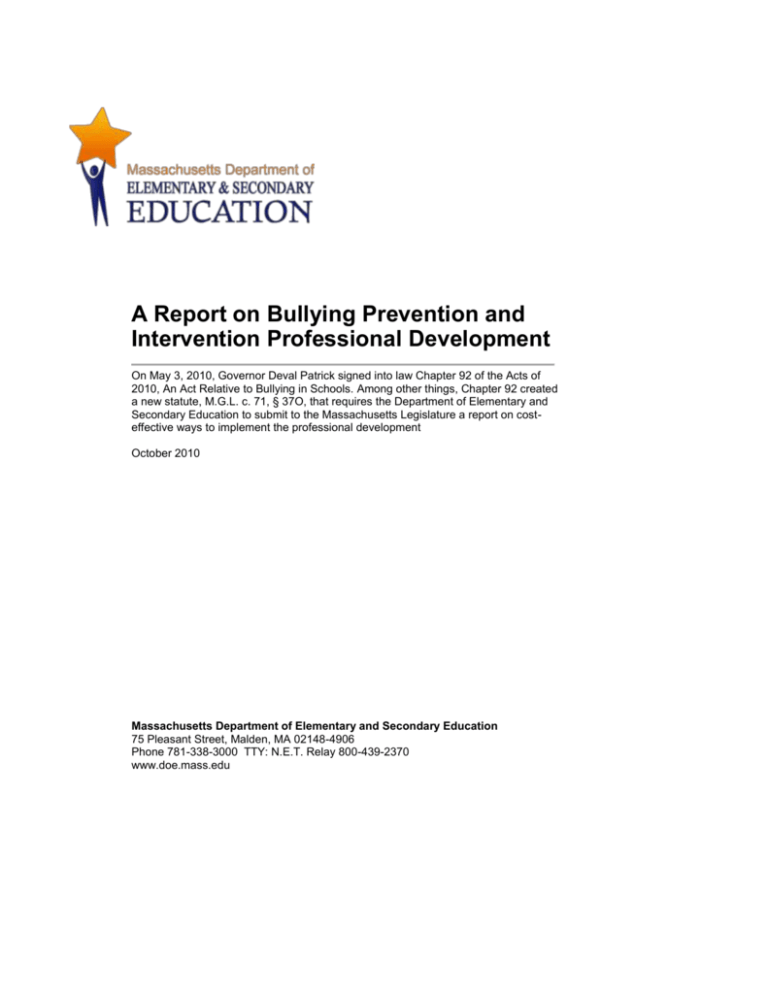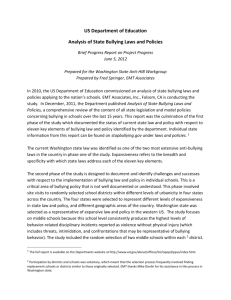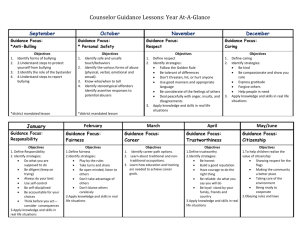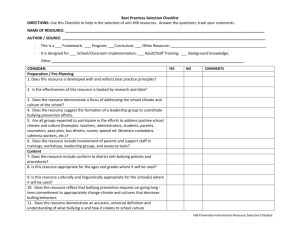A Report on Bullying Prevention and Intervention Professional
advertisement

A Report on Bullying Prevention and Intervention Professional Development On May 3, 2010, Governor Deval Patrick signed into law Chapter 92 of the Acts of 2010, An Act Relative to Bullying in Schools. Among other things, Chapter 92 created a new statute, M.G.L. c. 71, § 37O, that requires the Department of Elementary and Secondary Education to submit to the Massachusetts Legislature a report on costeffective ways to implement the professional development October 2010 Massachusetts Department of Elementary and Secondary Education 75 Pleasant Street, Malden, MA 02148-4906 Phone 781-338-3000 TTY: N.E.T. Relay 800-439-2370 www.doe.mass.edu This document was prepared by the Massachusetts Department of Elementary and Secondary Education Mitchell D. Chester, Ed.D. Commissioner Board of Elementary and Secondary Education Members Ms. Maura Banta, Chair, Melrose Dr. Vanessa Calderón-Rosado, Milton Ms. Harneen Chernow, Jamaica Plain Mr. Gerald Chertavian, Cambridge Mr. Michael D’Ortenzio, Jr., Chair, Student Advisory Council, Wellesley Ms. Beverly Holmes, Springfield Dr. Jeff Howard, Reading Ms. Ruth Kaplan, Brookline Dr. James E. McDermott, Eastham Dr. Dana Mohler-Faria, Bridgewater Mr. Paul Reville, Secretary of Education, Worcester Mitchell D. Chester, Ed.D., Commissioner and Secretary to the Board The Massachusetts Department of Elementary and Secondary Education, an affirmative action employer, is committed to ensuring that all of its programs and facilities are accessible to all members of the public. We do not discriminate on the basis of age, color, disability, national origin, race, religion, sex or sexual orientation. Inquiries regarding the Department’s compliance with Title IX and other civil rights laws may be directed to the Human Resources Director, 75 Pleasant St., Malden, MA 02148-4906. Phone: 781-338-6105. © 2010 Massachusetts Department of Elementary and Secondary Education Permission is hereby granted to copy any or all parts of this document for non-commercial educational purposes. Please credit the “Massachusetts Department of Elementary and Secondary Education.” This document printed on recycled paper Massachusetts Department of Elementary and Secondary Education 75 Pleasant Street, Malden, MA 02148-4906 Phone 781-338-3000 TTY: N.E.T. Relay 800-439-2370 www.doe.mass.edu Massachusetts Department of Elementary & Secondary Education 75 Pleasant Street, Malden, Massachusetts 02148-4906 Telephone: (781) 338-3000 TTY: N.E.T. Relay 1-800-439-2370 Mitchell D. Chester, Ed.D. Commissioner Dear Members of the General Court: I am pleased to submit this “Report on Bullying Prevention and Intervention Professional Development.” On May 3, 2010, Governor Deval Patrick signed into law Chapter 92 of the Acts of 2010, An Act Relative to Bullying in Schools. Among other things, Chapter 92 created a new statute, M.G.L. c. 71, § 37O, that requires the Department of Elementary and Secondary Education to submit to the Massachusetts Legislature a report on cost-effective ways to implement the professional development requirements of the statute that includes: (i) (ii) (iii) (iv) an option available at no cost or low cost to school districts, charter schools, approved private day or residential schools and collaborative schools; the feasibility of an option for a “train-the-trainer” model, so-called, with demonstrated success and an option for online professional development; other options that may be cost-effective; and a cost estimate for professional development. Through the Department’s initial review of professional development resources, the Department identified several programs that are free of charge or are available at limited cost. Depending upon local circumstances, there may be related costs for schools and districts. For example, Collective Bargaining Agreements (CBAs) may require stipends for mandated professional development. Additionally, the Department conducted a review of available resources for professional development. While there are existing programs that address social competency, bullying prevention and intervention is an emerging area of focus for which there are limited evidencebased resources. As such, the Department did not identify a comprehensive professional development program that addresses all of the statutorily required content areas. Information about available options is discussed in the report. The Department will post resources and articles on its webpage at www.doe.mass.edu/ssce/bullying/ and will update these listings on an ongoing basis. Please feel free to contact me if you have questions. Sincerely, Mitchell D. Chester, Ed.D. Commissioner of Elementary and Secondary Education Table of Contents I. INTRODUCTION .......................................................................................................... 1 II. NO COST AND LOW COST PROFESSIONAL DEVELOPMENT OPTIONS ............ 2 A. District Attorneys’ Offices ........................................................................................ 2 B. Massachusetts Aggression Reduction Center (MARC) ........................................... 2 C. State and Federal Agency Resources..................................................................... 3 D. Social Competency Curricula .................................................................................. 3 E. Department of Elementary and Secondary Education ............................................ 3 III. TRAIN THE TRAINER MODELS & ONLINE PROFESSIONAL DEVELOPMENT.... 3 A. Train the Trainer ...................................................................................................... 3 B. Online Professional Development ........................................................................... 3 IV. OTHER COST-EFFECTIVE WAYS TO ADDRESS PROFESSIONAL DEVELOPMENT ............................................................................................................. 4 A. Supplemental Information from Professional Associations...................................... 4 B. Programs from Advocacy Groups Focusing on Vulnerable Populations ................. 4 C. Resources for Cyberbullying and Internet Safety .................................................... 4 V. COST OF AND FUNDING FOR PROFESSIONAL DEVELOPMENT ........................ 5 I. INTRODUCTION On May 3, 2010, Governor Deval Patrick signed into law Chapter 92 of the Acts of 2010, An Act Relative to Bullying in Schools. Among other things, Chapter 92 created a new statute, M.G.L. c. 71, § 37O, which requires the Department of Elementary and Secondary Education (hereinafter “the Department”) to submit to the Massachusetts Legislature a report on costeffective ways to implement the professional development requirements of the statute that includes: (v) an option available at no cost or low cost to school districts, charter schools, approved private day or residential schools and collaborative schools; (vi) the feasibility of an option for a “train-the-trainer” model, so-called, with demonstrated success and an option for online professional development; (vii) other options that may be cost-effective; and (viii) a cost estimate for professional development. As described in M.G.L. c. 71, § 37O(d), the local bullying prevention and intervention plan for each school district, charter school, approved private special education day or residential school, and collaborative school must include a provision for ongoing professional development to build the skills of all staff members to prevent, identify, and respond to bullying. Staff is defined as including, but not limited to, educators, administrators, counselors, school nurses, cafeteria workers, custodians, bus drivers, athletic coaches, advisors to extracurricular activities, and paraprofessionals. The content of the professional development must include, but is not to be limited to: (i) (ii) (iii) (iv) (v) (vi) developmentally appropriate strategies to prevent bullying incidents; developmentally appropriate strategies for immediate, effective interventions to stop bullying incidents; information regarding the complex interaction and power differential that can take place between and among an aggressor, target, and witnesses to the bullying; research findings on bullying, including information about specific categories of students who have been shown to be particularly at-risk for bullying in the school environment; information on the incidence and nature of cyberbullying; and Internet safety issues as they relate to cyberbullying. In addition to the statutory requirements, the content of professional development will also be determined by local needs. To develop their local professional development plans, the Department recommends that schools and districts conduct a local level needs assessment, and review existing research in bullying prevention and intervention. This will help to determine professional development needs that are consistent with the requirements of the law and also address unique issues in the school environment. Given the demand for resources and the limited comprehensive programs available, schools and districts may need to plan for and execute professional development in multiple phases throughout the school year. 1 In drafting this report, the Department conducted an initial review of available resources for professional development. While there are existing programs that address social competency, bullying prevention and intervention is an emerging area of focus for which there are limited evidence-based resources. As such, the Department did not identify a comprehensive professional development program that addresses all of the statutorily required content areas. Information about available options is discussed below. The Department will post resources and articles on its webpage at www.doe.mass.edu/ssce/bullying/ and will update these listings on an ongoing basis. The Department neither approves nor evaluates specific professional development and professional development providers. However, the Department has an administrative process for registering professional development providers. Given the increasing demand for professional development in the area of bullying prevention and intervention, the Department anticipates that the number of registered professional development providers will increase. Information on the registration process is available at http://www.doe.mass.edu/pd/. II. NO COST AND LOW COST PROFESSIONAL DEVELOPMENT OPTIONS Through the Department’s initial review of professional development resources, the Department identified several programs that are free of charge or are available at limited cost. Depending upon local circumstances, there may be related costs for schools and districts. For example, Collective Bargaining Agreements (CBAs) may require stipends for mandated professional development. A. District Attorneys’ Offices A number of District Attorneys’ offices in the Commonwealth of Massachusetts provide professional development programs that are focused on bullying prevention and intervention and Internet safety. Schools and districts must contact each District Attorney’s office directly to discuss the availability of programs that address developmentally appropriate strategies for building social competency and bullying prevention and intervention skills. Contact information for the District Attorneys’ Offices is available from the Massachusetts District Attorneys Association (MDAA) at http://www.mass.gov/?pageID=dmdahomepage&L=1&L0=Home&sid=Dmdaa. B. Massachusetts Aggression Reduction Center (MARC) The Massachusetts Aggression Reduction Center (MARC), a non-profit educational research center located at Bridgewater State College, is offering five regional “Train the Trainer” workshops in the fall of 2010. These workshops will focus on cyberbullying and bullying prevention and intervention for school and district personnel. School staff trained in this model may then use the skills acquired and materials received to train their colleagues in the required content areas at no additional program cost. 2 C. State and Federal Agency Resources Curricula focusing on developmentally appropriate strategies for immediate, effective intervention to stop bullying incidents are available from a variety of state and federal agencies, including but not limited to the Massachusetts Office of the Attorney General, the Substance Abuse and Mental Health Services Administration (SAMSA), the National Registry of EvidenceBased Programs and Practices, the U.S. Department of Justice, and the U.S. Department of Education. Links to these resources are available on the Department’s Bullying Prevention and Intervention resources page at http://www.doe.mass.edu/ssce/bullying/. Also, some curricula used for the federal Safe and Drug Free Schools and Community Act Program may be appropriate to address bullying prevention and intervention. That information is also available on the Department’s bullying prevention and intervention website, or through the U.S. Department of Education. D. Social Competency Curricula There are various available skill-based curricula for social competency that contain information on bullying prevention. While these programs are generally focused on training students, some offer separate components for training school faculty. Available curricula range in price from several hundred dollars to over $1,000. These costs do not include related costs that districts and schools may incur to train all staff. E. Department of Elementary and Secondary Education On a limited basis, Department staff may be able to provide professional development in some content areas at no program cost. Two staff members are trained in bullying prevention and intervention curricula and are funded through the Safe and Drug Free Schools and Community Act Program. However, this limited resource will be available only during the 2010-2011 school year because the federal Safe and Drug Free Schools and Community Act Program is not funded after June 20, 2011. III. TRAIN THE TRAINER MODELS & ONLINE PROFESSIONAL DEVELOPMENT A. Train the Trainer In order to reduce costs and sustain program implementation, districts and schools may minimize up-front costs for curricula and training programs by using a “train the trainer” approach, similar to the program that is being offered by MARC. A core number of staff, as determined by the school or district, may participate in professional development programs or use existing professional development resources, and then train other school and district staff in their content. A number of resources listed above are structured as “train the trainer” programs, or may be adapted for this purpose by schools and districts. B. Online Professional Development The Department is in the process of creating a web-based tool for professional development and training for use by schools and districts to train local school staff on the general roles and the 3 responsibilities of all staff under the law. It is anticipated that the tools will be available at no cost via a DVD or an online download site no later than the spring. Additionally, numerous online training courses and webinars on bullying prevention and intervention are easily available on the Internet. The Department has not evaluated the courses to determine whether their content is aligned with the statutory requirements. Schools and districts may wish to review them to see whether they meet local professional development needs. IV. OTHER COST-EFFECTIVE WAYS TO ADDRESS PROFESSIONAL DEVELOPMENT A. Supplemental Information from Professional Associations Since May of 2010, several professional organizations and associations have offered informational sessions to their membership on the bullying prevention and intervention law. Those associations include but are not limited to the Massachusetts Association of School Superintendents, the Massachusetts School Counselors Association, the Anti-Defamation League (ADL), and the Massachusetts Interscholastic Athletic Association (MIAA). The Department has participated in some of these sessions and will be participating in additional programs with these and other professional and allied agencies. To the Department’s knowledge, however, no previously offered or currently available program addresses all of the law’s professional development requirements. B. Programs from Advocacy Groups Focusing on Vulnerable Populations In local needs assessments and planning, schools and districts may determine that one supplemental area for professional development should focus on bullying prevention and intervention for vulnerable student populations, including but not limited to students with disabilities; students who are gay, lesbian, bisexual, or transgendered; and students who are homeless. There are resources for professional development focusing on these populations that have been supported by several professional associations with the assistance of the state agencies and professional associations. Several organizations, including but not limited to Massachusetts Advocates for Children; the Federation for Children with Special Needs; Gay, Lesbian and Straight Education Network; and Gay and Lesbian Advocates and Defenders, have contacted the Department to express interest in supporting professional development on bullying prevention and intervention. C. Resources for Cyberbullying and Internet Safety Cyberbullying and Internet safety is an area of emerging focus in bullying prevention and intervention stemming from the increase in students’ access to and use of electronic communication. The programs offered by MARC are largely focused on cyberbullying. Also, the Attorney General’s Office has an established program focusing on Internet safety and electronic communication, and publishes resources for schools on its website at http://www.mass.gov/?pageID=cagotopic&L=3&L0=Home&L1=Community+Safety&L2=Cybe r+Crime+%26+Internet+Safety&sid=Cago. A number of schools and districts participated in 4 these programs prior to the enactment of the bullying prevention and intervention legislation. Additional programs are available through the agencies and organizations named in this report. V. COST OF AND FUNDING FOR PROFESSIONAL DEVELOPMENT As professional development for bullying prevention and intervention is a new focus, there are a number of variables that will affect the delivery of the professional development. There will be costs at the school and district level as well as at the state level. The variables and costs will depend on the approaches to professional development by the districts. Costs for any type of training include, at a minimum, time for staff to attend the training, the design and schedule of the professional development and the cost of necessary coverage. Incorporating bullying prevention and intervention professional development with other professional development conducted in a district embraces a whole-school approach and provides a cost-management solution. In addition, expenses may be mitigated by combining resources with other communities as a cost-effective strategy. Specific costs will be determined by the school or district. The Department will use carryover funds from the federal Safe and Drug Free Schools and Community Act Program to provide grants to school districts and charter schools totaling approximately $1,000,000. Districts can use these funds to pay for bullying prevention and intervention training and professional development, provided that the funds are used for evidence-based programs. Funding ends for this program on June 30, 2011. This is a requirement for the use of funds under the Principles of Effectiveness for the Safe and Drug Free Schools and Community Act Program. Available funding levels using these carryover funds are minimal considering the depth and scope of professional development that schools and districts must provide to staff under the bullying prevention and intervention law. To oversee the implementation of the new law, including support for professional development, the Department estimates that its costs during this first year will be $200,000. This includes the equivalent of 1.5 full-time staff for researching bullying prevention and intervention strategies; development of the model bullying prevention and intervention plan for schools and districts; creation of a system for collecting plans that schools and districts must file with the Department by December 31, 2010; promulgation of regulations; drafts of guidance documents and best practice resources; and creation of guidelines for the implementation of social and emotional learning curricula in grades kindergarten through 12 inclusive, by June 30, 2011. Thereafter, the annual cost to the Department to research and update available bullying prevention and intervention resources and guidance documents, including professional development resources, and to provide technical assistance to schools and districts, will be initially $100,000. The design and delivery of appropriate professional development for all school staff and the sustainability of ongoing quality professional development for all school staff is critical to ensuring a safe climate for all students within the Commonwealth of Massachusetts. The Department will continue to investigate available resources as they are developed. 5








